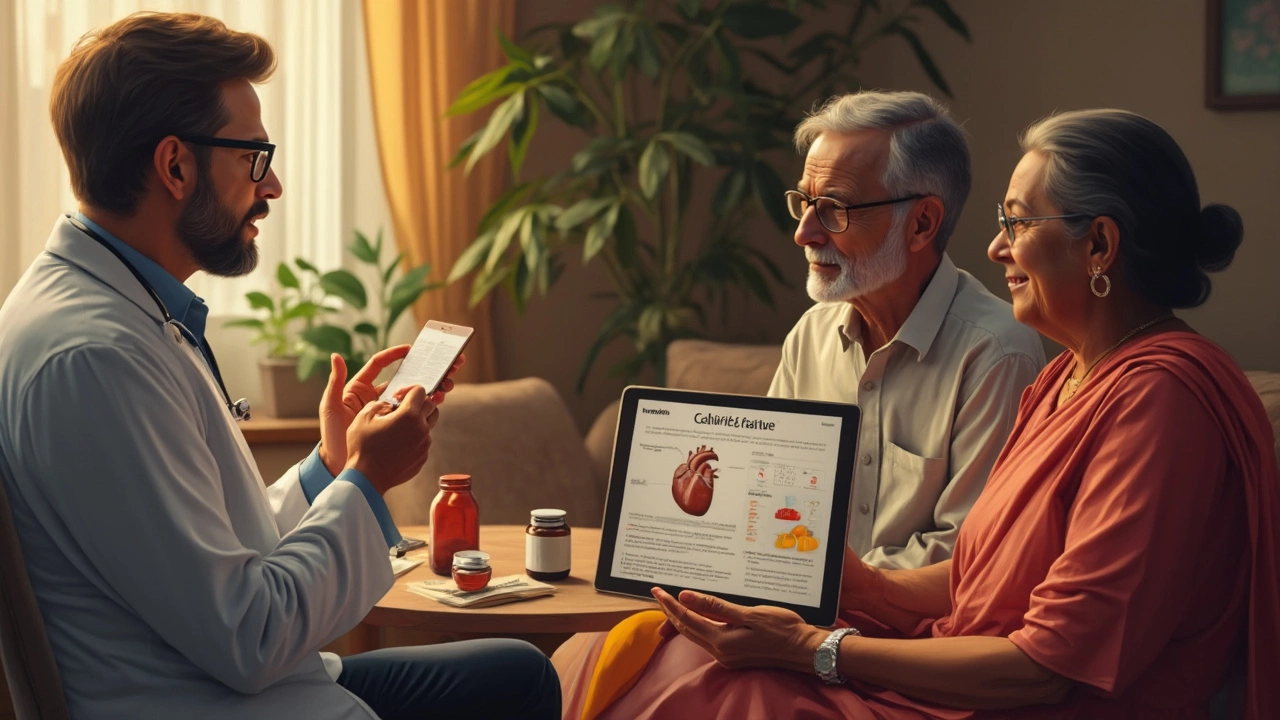Open up any supplement rack and CoQ10 bottles are everywhere, right next to the multivitamins and fish oil. But what does it actually do for your body? To get to the point—CoQ10 is a natural compound you already have in your cells. Its main job? Helping your body turn food into energy and keeping your cells safe from stress.
The cool part is, your heart, brain, and muscles need loads of energy, so they have extra CoQ10 packed inside. Trouble is, as you get older or if you take certain meds, your CoQ10 levels can drop. That’s where supplements come in—sort of like giving your cells a much-needed energy boost so you don’t feel as tired or sluggish.
Lots of folks grab CoQ10 hoping for more energy, but the buzz doesn’t stop there. Athletes try it for better performance, while people with heart issues sometimes use it alongside their regular meds. It’s not a magic fix, but real-world research does point to some solid benefits, especially if you’re low on CoQ10 to start with.
- What Actually Is CoQ10?
- Key Benefits Backed by Facts
- Who Might Need Extra CoQ10?
- Smart Tips for Using CoQ10
What Actually Is CoQ10?
CoQ10 stands for coenzyme Q10. Yeah, the name sounds kind of like something out of a chemistry textbook, but it's actually a vitamin-like thing your own body makes in every cell. Main job? It helps turn carbs and fats from your food into fuel, making energy in a process called ATP production. No CoQ10, no spark for your body’s engine—simple as that.
If you want to get technical, it sits inside something called mitochondria—your cell’s power plants. That’s why your heart, brain, and muscles (the hungry energy users) have more of it than other parts.
But it’s not just about energy. CoQ10 is also a powerful antioxidant, which means it helps protect your cells from daily wear and tear, especially from stuff called free radicals. Free radicals? Think of them like microscopic troublemakers that speed up aging and mess with your health over time.
- Your body makes less CoQ10 as you age. By 40, you could have 20-25% less than in your twenties.
- Some cholesterol meds (like statins) lower CoQ10 levels, leading to more muscle aches for some people.
- You can get a bit of CoQ10 from food, but it's hard to eat enough to make up for a drop. Foods like beef, pork, sardines, spinach, and peanuts have small amounts.
| Food Source | Approx. CoQ10 per Serving (mg) |
|---|---|
| Beef heart (3 oz) | 2.6 |
| Chicken thigh (3 oz) | 1.4 |
| Peanuts (1 oz) | 0.8 |
| Soybean oil (1 tbsp) | 1.3 |
The most important thing? CoQ10 lets your body keep running at full speed. If energy or cell protection matter to you, keeping enough CoQ10 in your system is key. That’s why folks with heart problems, folks taking statins, and even athletes pay attention to their levels.
Key Benefits Backed by Facts
So, what’s the real deal with CoQ10? A bunch of folks use it, but let’s get real about what science actually says. The top headline: your body uses CoQ10 to fire up your cells. Without enough of it, you might feel tired or worn down, and your heart might not work at its best.
Let’s break down the real benefits people have noticed in studies and everyday life:
- Heart Health: CoQ10 supplements have been shown to help with certain heart problems. For example, some research found people with heart failure who took CoQ10 had fewer hospital visits and could exercise longer. Statin users, who often get muscle pain from their meds, sometimes feel better with extra CoQ10.
- Energy and Fitness: This stuff helps convert food into energy. Some studies show athletes taking it see less fatigue and recover faster after workouts. If you're always worn out after exercise, CoQ10 might be worth a try.
- Migraine Relief: Several trials say that regular CoQ10 can cut down on how often you get migraines and make them less severe. That’s a big deal for anyone who deals with headaches that knock them out for days.
- Protecting Your Cells: Since CoQ10 is an antioxidant, it fights off cell damage from stress and aging. Early studies even hint it could help slow down memory loss, though more research on this is still rolling in.
Here’s a quick look at what some research shows:
| Benefit | Evidence |
|---|---|
| Heart Failure Support | Improved heart function and reduced symptoms in patients in some studies. |
| Migraine Frequency | Reduced migraine attacks by up to 50% in some clinical trials. |
| Exercise Recovery | Quicker recovery and less muscle fatigue for some athletes. |
| Antioxidant Support | Helps limit damage from oxidative stress. |
So if you’ve got one of these issues or just need to keep your energy up, CoQ10 is worth a closer look. Keep in mind, though, it works best for folks who are low in it to begin with, like older adults or those on certain meds.

Who Might Need Extra CoQ10?
Some people’s bodies just don’t make enough CoQ10, and that’s when a supplement can really make a difference. You don’t have to guess—certain groups stand out when it comes to low levels and possible benefits from topping up.
- People over 40: Your natural CoQ10 drops as you age. If you wake up feeling low on energy or your workouts drag, this might be part of the problem.
- Those on statins: Cholesterol-lowering drugs (statins) block not just cholesterol but also your body’s CoQ10 supply. It’s actually a well-known side effect, leading to sore muscles and tiredness.
- Folks with heart failure: Doctors sometimes suggest CoQ10 for people with certain heart conditions. It won’t replace your medicine, but studies have shown it can help with energy and exercise.
- Migraines: Clinical trials have found that taking CoQ10 might make migraines less frequent or intense in some people.
- People doing hard workouts: If you’re pushing your limits in training, CoQ10 can help muscle recovery and performance (it won’t turn you into a superhero, but every bit helps).
Some research says up to 1 in 2 people over 60 could have much lower CoQ10 levels than younger folks. That’s a huge percentage—no wonder so many older adults look into this supplement.
| Group | Average CoQ10 Reduction | Possible Benefits |
|---|---|---|
| People on statins | Up to 40% | Less muscle pain/tiredness |
| Heart failure patients | 30-50% | Better energy, improved symptoms |
| Adults over 60 | 20-40% | General health, better vitality |
| Chronic migraine sufferers | Not measured | Fewer severe headaches |
Bottom line: If you fit one of these groups and struggle with low energy, muscle pain, or headaches, it’s worth talking to your doctor about whether CoQ10 could help. And if you read supplement labels, make sure to spot CoQ10 as the main ingredient, not some mystery blend.
Smart Tips for Using CoQ10
Getting the most out of CoQ10 is pretty simple, but there are a few things you should know so you don't waste your money or end up feeling let down. Most people take CoQ10 for heart health, energy, or to help out with exercise recovery. But just grabbing the first bottle you see won’t cut it. Here’s what actually matters:
- CoQ10 comes in two main forms: ubiquinone and ubiquinol. Ubiquinol is the active form and your body absorbs it a bit easier, especially if you’re over 40 or have trouble digesting fats.
- Take it with a meal that has fat—like avocado toast, eggs, or peanut butter. CoQ10 is fat-soluble, so your body won’t soak it up well on an empty stomach or with only a salad.
- Check the dose. Common doses are 100-200 mg per day, but some folks with specific conditions take 300 mg or more. It’s smart to start at the low end until you see how you feel.
- If you’re on cholesterol meds (statins), CoQ10 can make a difference. Statins lower CoQ10 levels, and some studies say adding CoQ10 might help with muscle aches caused by those meds.
- Quality matters. Go for brands tested by third-party labs. If you see the USP Verified or NSF Certified mark, you know you’re not getting junk.
If you want to see how CoQ10 stacks up in real life, here’s a quick breakdown of what people usually notice after adding it to their routine:
| Benefit | Typical Time to Notice Changes |
|---|---|
| More energy/reduced tiredness | 1–4 weeks |
| Less muscle ache on statins | 2–6 weeks |
| Cardiovascular support | 1–3 months (regular use) |
If you’re pregnant, breastfeeding, or taking meds beyond statins (like blood thinners or chemo), talk to your doctor before grabbing a bottle. When used right, CoQ10 is pretty safe, but no supplement is one-size-fits-all.
